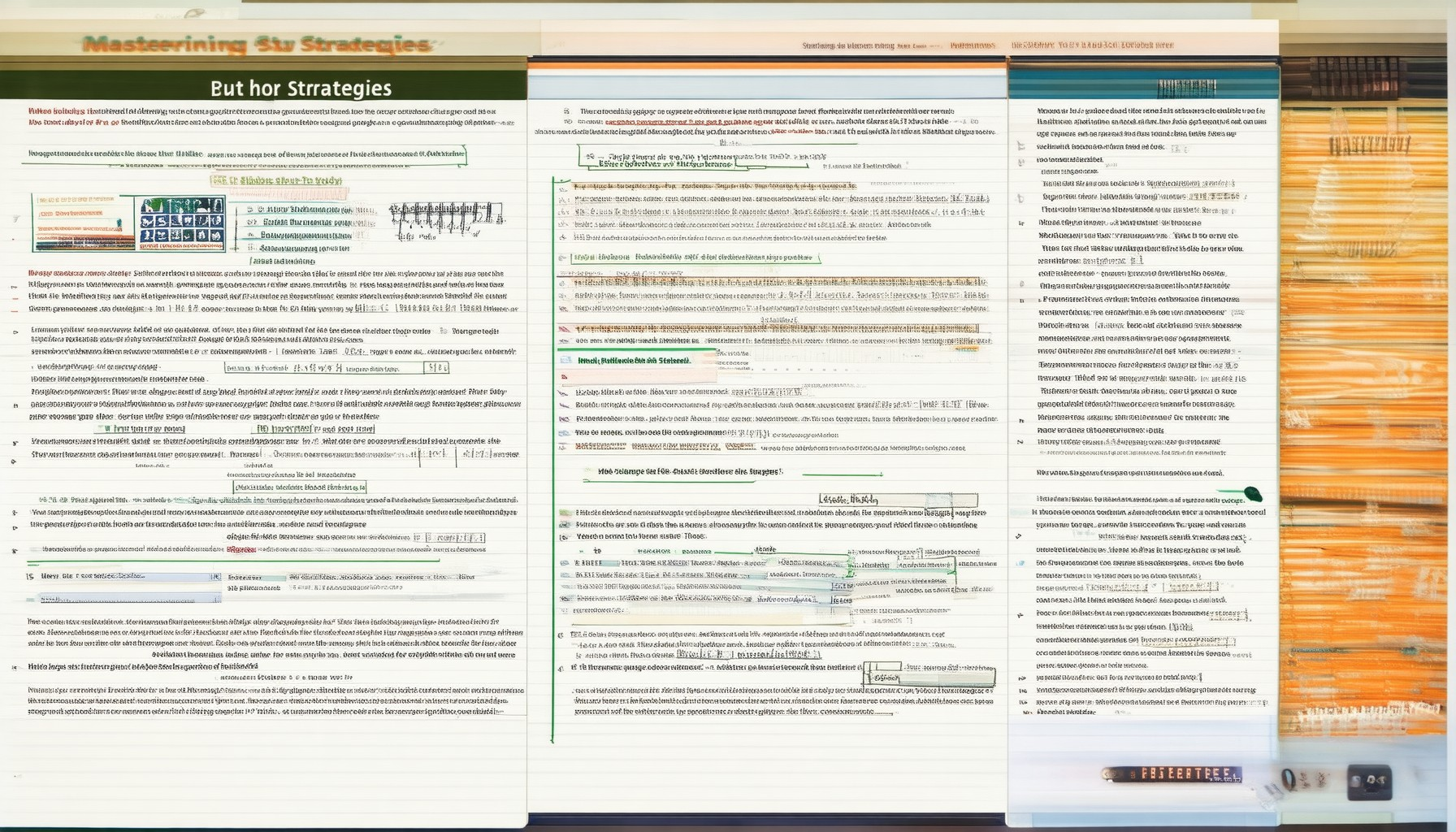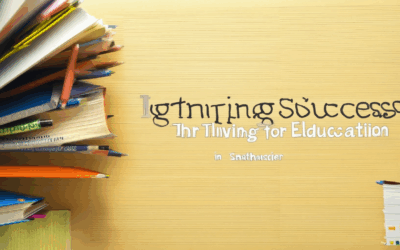Struggling to keep up with your studies and wondering if there’s a better way to maximize your learning potential? Have you ever wished for a roadmap that could help you stay focused, organized, and productive during exam season? If so, you’re not alone. Many students face challenges when it comes to finding effective study strategies that fit their unique learning styles and schedules. Whether you’re juggling multiple subjects, dealing with test anxiety, or simply looking to improve your academic performance, discovering the right study techniques can make all the difference.
Key Takeaways
- Learn effective time management techniques to optimize your schedule
- Discover active learning methods to enhance retention and understanding
- Understand the importance of consistent routines and goal-setting
- Gain insights into test preparation strategies for exam success
- Develop critical thinking skills for analytical problem-solving
- Explore stress reduction techniques to maintain focus during studies
- Utilize resources and tools to streamline your study process
- Benefit from real-life case studies and examples of successful learning
- Engage with a supportive community for shared experiences and tips
- Stay updated with continuous learning opportunities and evolving techniques
- Master time management tools like the Pomodoro Technique
- Engage in active learning techniques supported by cognitive science
- Organize your study environment for maximum concentration
- Schedule regular review sessions to reinforce memory
- Join study groups for collaborative learning and deeper understanding
- Establish structured study schedules for consistent progress
- Practice mindfulness to reduce stress and improve focus
- Explore evidence-based learning approaches for better outcomes
- Create an optimal study space to boost concentration
- Reflect regularly on your learning progress and identify areas for improvement
What Makes a Great Study Strategies Blog
A great study strategies blog is characterized by several key elements that make it informative, engaging, and useful for its audience. Here’s a breakdown of what sets apart a top-performing study blog:
1. High-Quality Content
- Original and Thoughtful Articles: The content should be unique, well-researched, and free from plagiarism. Focus on delivering fresh perspectives and actionable advice that resonates with students.
- Actionable Tips: Provide practical strategies that readers can easily implement. Avoid vague or theoretical information that doesn’t translate into real-world application.
- Evidence-Based Insights: Incorporate research-backed methods and studies to lend credibility to your advice. Cite reliable sources whenever possible to establish authority.
2. Organized and User-Friendly Structure
- Clear Headings and Subheadings: Use hierarchical headings (e.g.,
,
) to make the content easy to navigate. Break down complex topics into digestible sections.
- Consistent Formatting: Maintain a clean layout with proper spacing, bullet points, and visuals to enhance readability. Avoid clutter and ensure the design is intuitive.
- Searchable Content: Optimize your blog posts for search engines by using keywords naturally within the content. Include meta descriptions and alt texts for images.
3. Engaging and Relatable Tone
- Approachable Language: Write in a friendly and conversational tone that resonates with students of all ages. Avoid jargon or overly technical terms unless necessary.
- Real-Life Examples: Share personal stories, case studies, or examples of how the strategies have worked in real life. This helps readers connect with the content emotionally.
- Interactive Elements: Include quizzes, polls, or downloadable resources to engage readers and encourage them to apply the strategies discussed.
4. Visual Appeal
- Infographics and Charts: Use visuals to break down complex concepts into simple, easy-to-understand graphics. This makes the content more engaging and memorable.
- Videos and Tutorials: Consider adding video content or screencasts to demonstrate study techniques in action. Visual learners often benefit from this format.
- High-Quality Images: Use professional-quality images or icons to enhance the overall look and feel of the blog. Ensure they are relevant to the content and properly credited.
5. Community Building
- Comment Section: Enable comments on your blog posts to foster a sense of community. Respond to questions and feedback to build trust with your audience.
- Forums or Q&A Sections: Create dedicated spaces where readers can ask questions, share experiences, and support each other. This strengthens the bond between the community and the blog.
- Social Media Integration: Promote discussion on social media platforms by sharing blog posts and encouraging followers to join the conversation. Use relevant hashtags to increase visibility.
6. Consistency and Authority
- Regular Updates: Publish consistently to keep your audience engaged and attract new visitors. A regular posting schedule helps establish your blog as a trusted resource.
- Credibility-Building: Showcase your expertise through guest posts, interviews, or collaborations with education professionals. Highlight any certifications or achievements to strengthen your authority.
- Linking to Resources: Reference reputable external sources and include links to helpful guides, tools, or courses. This demonstrates that you’re connected to the broader educational community.
Competitor Analysis
- Khan Academy: Known for its comprehensive approach to learning, Khan Academy offers valuable insights into effective study habits and academic success. Visit their homepage to explore their resources.
- Coursera: As a leading online learning platform, Coursera provides access to university-level courses that can inspire and inform your study strategies. Check out their main page .
- Enroll Maven: Specializing in guiding students through effective learning strategies, Enroll Maven offers tailored advice and resources to help students excel academically. Explore their learning guides for actionable tips and techniques.
By combining these elements, a study strategies blog can become a go-to resource for students looking to improve their academic performance. Keep your content fresh, engaging, and aligned with your audience’s needs to build a loyal community around your blog.
Best Study Strategies for Improving Academic Performance
We’ve compiled proven study techniques and strategies to help you excel academically and achieve your goals. Consistency, organization, and efficient learning habits are key to long-term success.
Key Strategies for Effective Learning
- Set Clear Goals: Define what you aim to achieve and create a study schedule that aligns with your priorities. Break larger tasks into manageable chunks to avoid feeling overwhelmed.
- Active Learning Techniques: Engage with the material actively through summarization, teaching others, or applying concepts to real-world scenarios to enhance retention.
- Use Multiple Modalities: Combine different learning styles—visual, auditory, and kinesthetic—to reinforce memory. This includes reading, listening to podcasts, and taking notes in varied formats.
- Practice Regular Review: Categorize information into your own hierarchical structure and revisit it periodically rather than cramming before exams.
- Stay Organized with Tools: Utilize planners or digital tools to track assignments, deadlines, and progress, ensuring nothing gets overlooked.
- Seek Support Networks: Join study groups or forums to discuss challenges and gain insights from peers facing similar situations.
- Limit Distractions: Create a dedicated study space free from interruptions and establish routines to maximize focus during critical learning sessions.
- Stay Healthy: Adequate sleep, nutrition, and exercise significantly impact cognitive function and concentration, so prioritize self-care.
- Reflect and Adapt: After each study session, reflect on what worked and what didn’t to continuously improve your approach.
Additional Tips for Academic Success
- Break Tasks into Smaller Steps: Large projects can feel daunting, so divide them into smaller, achievable tasks to build momentum and reduce stress.
- Stay Curious and Motivated: Develop a genuine interest in your subjects and set personal milestones to maintain drive and engagement.
- Use Technology Wisely: Leverage apps and tools designed to enhance studying, such as flashcard apps or mind-mapping software.
- Stay Informed About Competitors: Keep an eye on leading platforms like Coursera and Udemy to stay updated on innovative study methods and resources.
- Consider Professional Development: Explore workshops, webinars, and certifications offered by platforms like LinkedIn Learning to broaden your skillset.
By implementing these strategies, you can create a robust foundation for academic success and unlock your full potential. Remember, consistent effort and adaptability are key to achieving long-term goals.
How to Create an Effective Study Strategies Blog
Creating an effective study strategies blog requires a combination of clear organization, actionable advice, and engaging content. Below are key steps and strategies to help you craft a blog that resonates with your audience and provides lasting value.
1. Define Your Purpose and Audience
Start by understanding who your target audience is and what problems you aim to solve. Are you addressing students struggling with time management, or professionals looking to enhance their productivity? Tailor your content to meet their specific needs.
2. Outline Your Content Structure
Organize your blog into logical sections that guide readers from problem identification to solution implementation. Consider using:
- Introduction
- Key Study Strategies
- Tools and Resources
- Implementation Tips
- Conclusion
3. Develop Actionable Content
Each section should offer practical, step-by-step advice. For example:
- Pomodoro Technique: Explain how to set 25-minute study intervals followed by 5-minute breaks, and provide a sample schedule.
- Active Recall: Share exercises like quiz retractions and suggest using flashcards for quick reviews.
- Spaced Repetition: Discuss scheduling review sessions over days or weeks and recommend apps like Anki.
4. Enhance With Real-Life Examples
Make your advice relatable by sharing personal stories or case studies. For instance, describe how a student transformed their grades using these strategies.
5. Add Value Through Extra Resources
Incorporate downloadable guides, checklists, or templates that complement your advice. For example, offer a free study planner workbook.
6. Optimize For SEO And Readability
Use keywords like “effective study habits” and “study tips” naturally throughout your content. Maintain short paragraphs and use headings and bullet points for better readability.
7. Include Calls To Action
End your blog with a call to action, such as inviting readers to share their favorite study tips in the comments or download a free resource.
8. Proofread And Edit
Ensure your content is free of errors and flows smoothly. Edit for clarity, conciseness, and engagement to make your blog stand out.
By following these steps, you can create a study strategies blog that not only informs but also inspires your readers to adopt new, effective habits. Start crafting today and watch your audience grow!
What Can You Learn from a Study Strategies Blog?
A study strategies blog offers a wealth of knowledge and insights tailored to help individuals optimize their learning process and achieve academic success. Here are some key takeaways you can gain:
- Effective Time Management Techniques:** Learn how to organize your schedule and allocate time efficiently for studying, assignments, and relaxation.
- Active Learning Methods:** Discover strategies like teaching others, using flashcards, or applying concepts through hands-on activities to enhance retention.
- Study Habits and Routines:** Understand the importance of consistent routines, setting clear goals, and creating a dedicated study environment.
- Test Preparation Strategies:** Gain insights into preparing for exams effectively, including timing exercises, practicing past papers, and managing test anxiety.
- Critical Thinking Skills:** Develop the ability to analyze information critically and approach problems systematically.
- Stress Reduction Tips:** Learn coping mechanisms to manage stress and maintain focus during study sessions.
- Resource Utilization:** Explore tools, apps, and websites that can aid in note-taking, organizing tasks, and tracking progress.
In addition to these, a study strategies blog often provides:
- Real-Life Case Studies:** Insights from successful students or professionals who have applied these strategies to achieve their goals.
- Community Support:** Forums or groups where you can connect with peers and share experiences, tips, and challenges.
- Continuous Improvement:** Updated content and resources to keep up with evolving learning techniques and technologies.
By leveraging the insights from a reputable study strategies blog like Enroll Maven , you can unlock powerful techniques that transform your learning journey and set you on the path to long-term academic success. Whether you’re a student, parent, or educator, these resources are designed to empower you with the tools needed to excel in your endeavors.
What Are the Key Study Strategies You Can Learn from a Study Strategies Blog?
Enroll Maven offers a wealth of insights and strategies to enhance your learning process. By exploring our study strategies blog, you can unlock techniques to boost efficiency, manage time effectively, and stay focused during your studies. Here are some key strategies you might discover:
- Time Management:** Learn how to prioritize tasks and allocate study time wisely. Effective time management is crucial for maximizing productivity and ensuring you cover all essential topics.
- Active Learning:** Engage with the material actively rather than passively reading. Techniques like summarizing, teaching others, and applying concepts can significantly improve retention and understanding.
- Effective Note-Taking:** Develop organized note-taking systems that help you retain information better. Methods like the Cornell Method or mind mapping can transform your study approach.
- Mindfulness and Focus:** Practice mindfulness exercises to reduce stress and improve concentration. A calm and focused mindset is essential for high-quality studying.
- Regular Review and Retrospection:** Schedule regular review sessions to reinforce memory and ensure you’ve retained the information. Reflecting on what you’ve learned can also highlight gaps in knowledge.
- Study Groups and Collaboration:** Join study groups or collaborate with peers to discuss challenging topics. Shared perspectives can deepen understanding and provide new insights.
For more detailed guides on each of these strategies, explore our comprehensive study strategies resources . Whether you’re preparing for exams, tackling coursework, or aiming to improve overall academic performance, our blog has valuable insights to help you succeed.
Key Study Strategies from a Leading Study Blog
Enroll Maven offers valuable insights into effective study strategies through its comprehensive blog. By exploring posts on topics like time management, note-taking techniques, and exam preparation, readers can unlock proven methods to enhance their learning process.
- Structured Planning:** Learn how to organize your study schedule effectively by setting clear goals and prioritizing tasks. This approach helps in maintaining focus and ensuring consistent progress.
- Active Learning Techniques:** Discover strategies such as teaching others or applying concepts immediately to reinforce memory retention. These methods are backed by cognitive science principles.
- Effective Time Management:** Develop techniques to balance study time with other responsibilities. Tools like the Pomodoro Technique can help optimize productivity during study sessions.
- Optimal Study Environment:** Understand the importance of minimizing distractions and creating a conducive study space. A quiet, organized environment can significantly boost concentration levels.
- Regular Review and Reflection:** Establish a routine for reviewing notes and reflecting on what was learned. This habit helps in retaining information more effectively and identifying areas needing improvement.
Enroll Maven’s blog also provides resources on dealing with test anxiety and overcoming procrastination, offering practical advice that can transform your study habits. Whether you’re a student, parent, or educator, there’s something valuable for everyone.
For more insights, visit Enroll Maven’s dedicated learning strategies section: Learning Strategies . Explore additional tips and guides tailored to enhance your academic journey.
By adopting these strategies, you can elevate your study habits and achieve your educational goals more efficiently.









0 Comments